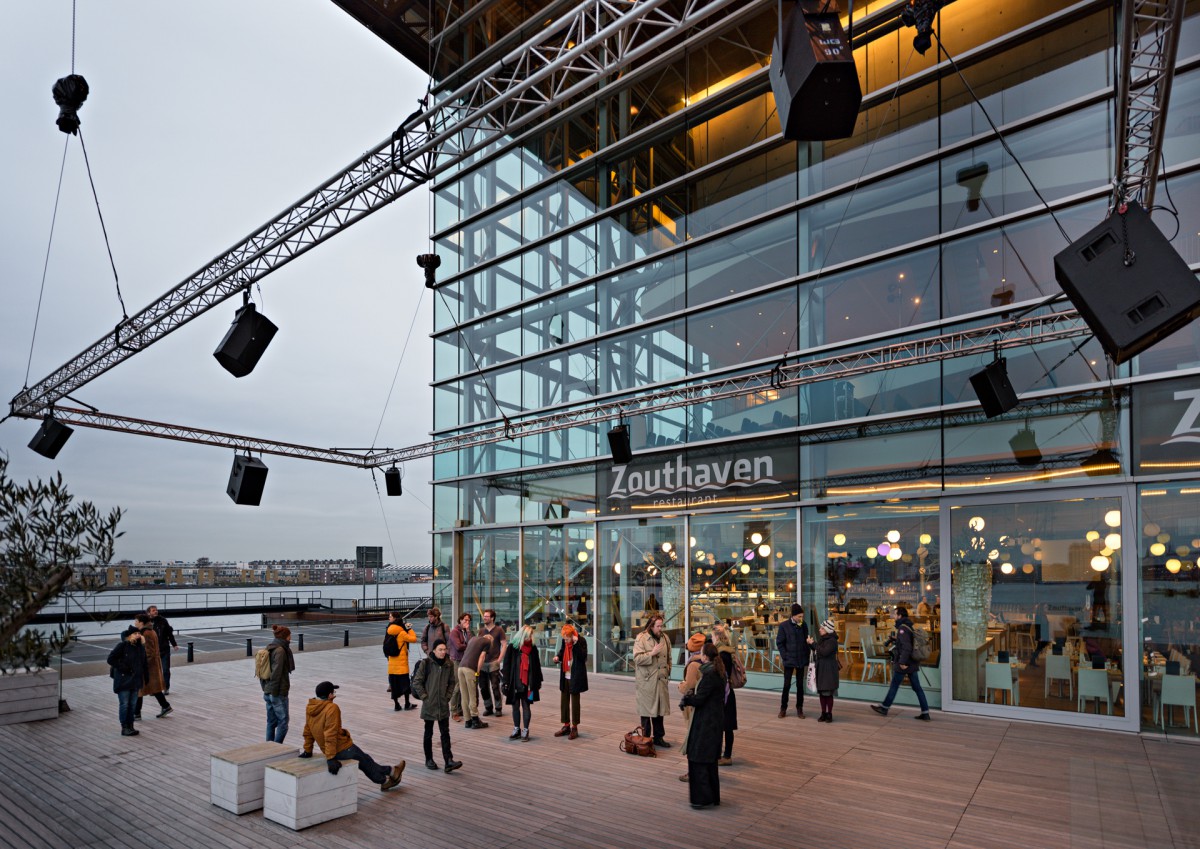Sunday 26 February 20:02

Jana Winderen's Spring Bloom, photo by Pieter Kers
by
Annabel McSpadden
I bunch my jacket around my neck and huddle into myself, alone beside the windswept Port of Amsterdam. Gray water stretches beneath a slate winter sky, and here on the Muziekgebouw aan ‘t IJ terrace, a suspended rectangular scaffold supports eight speakers angled toward me.
In her outdoor exhibit,
Spring Bloom in the Marginal Ice Zone, Jana Winderen has compiled her recordings of life in Arctic waters. I hear, as I steel myself against the February wind, the symphony of the Barents Sea’s annual planktonic bloom – the atonal music of feeding humpbacks cuts through ice formations rumbling against one another, bodies emerging from bubbling water, orcas calling in static staccato. Seals cry, fish release their eggs.
Shivering in solitude on a gray stone platform, surrounded by shipping boats’ industrial wanderings, I feel like one of these sea creatures. I live amidst the inhospitable grayness of their arctic night; I hear their music and bloom against the cold world.
By placing these sounds at the edge of the port, Winderen establishes an inseparable relationship between her piece and the water before me. This integration of sound and presence makes me wonder what lies beneath this surface – what possibility, what mystery. The deliberate location of her exhibit imbues it with a magical sense of place and unity, but once I leave the scaffold’s protective embrace, I understand the darkness of this magic.
Inside the Muziekgebouw, Winderen has placed a table against a glass wall. I sit and put on a pair of headphones, and the Arctic greets me once again. Now, though, a human voice accompanies the sounds. In the midst of this fantastical music – this life and water, the nonhuman voices, the fluid motion – I begin to understand Spring Bloom’s gravity.
Between recordings, Winderen has included her interview with scientist Carlos Duarte. Duarte explains that the oceanic “spring bloom” occurs at the transitional meeting of frozen and unfrozen sea, the “marginal ice zone,” and it creates the largest carbon sink on our planet. Algae explodes to life in the water column, painting it green, drifting through the Arctic in a tribute to life amidst barrenness. Diatoms flourish, die, and sink to the bottom of the sea, establishing an area super-saturated with carbon.
We can take the vital signs of the Arctic to understand what our ocean has in store, and what this means for our precious earth. Duarte calls the region the “forefront of climate change,” explaining that metamorphosis here foretells what will happen in the rest of our planet if we do not adapt our strategies to the immediacy of death, if we do not ally with orcas, cod, seals. The Arctic, he says, will inevitably lose all of its ice; so will other areas, unless we stop this tragic melt from diffusing into lower latitudes.
Duarte’s voice fades out, and I again find myself awash in organic composition. Now, though, the whale cries cut into me. They resound in an elegiac tribute to what has been lost, what will be lost. They beg me to listen and be moved, to be touched by their music and to honor the waters that have touched me.
Is it possible to politicize sound, or is sound inherently nonpolitical? Sound stands alone and moves where it desires, touches us in the places we want to understand, and we manipulate this contact in desperate attempts to unify our own muddled experiences. We want our earth and its music to assure us that all is easily understood, all plainly felt. And yet, though I may spend my life riding sound waves to conclusions I predetermine and desperately pursue, here I stand against this cold harbor; I cannot disentangle my neat and tidy resolutions from their sources.
Though sometimes I wish I could walk away from the forbidding water’s edge feeling only the wonder of ocean sounds, I cannot unfeel the darkness. Winderen’s sounds are not political, but the relationship she establishes between me and sound is. I could just listen, enjoy the magic and leave, but to do so would be dishonest, would deny the damage I hear within the sound, would ignore the duty I have to the magic. The music of the spring bloom will die if we do not move ourselves to protect it, and then what will be left to comfort us?